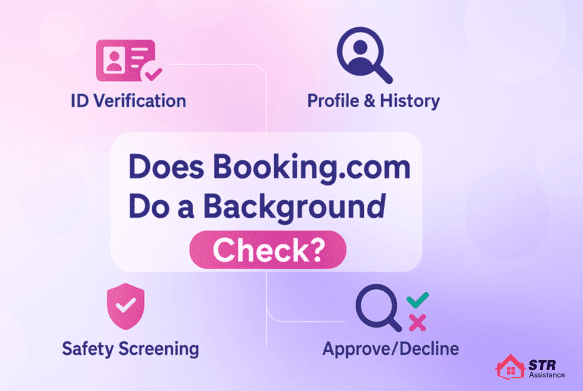Booking.com is one of the largest travel platforms in the world, connecting millions of guests with hotels, vacation rentals, and private homes. Guests get an easy way to book stays, and hosts get the chance to reach more people. But with the growth of the short-term rental market, safety concerns for hosts are also rising. For Booking.com hosts the most common question is “Does Booking.com do background checks on guests?”
The short answer is, not in the way you may expect. Booking.com does not run full criminal or personal background checks on guests.
However, they do use several verification and fraud-prevention measures. In 2022, Booking.com began developing advanced safety tools powered by AI and machine learning. These tools help protect hosts by identifying risky bookings, detecting suspicious activity, and preventing fraud before it happens.
So, how much can you really trust Booking.com’s screening process? In this article, we’ll explain what Booking.com does to vet guests, how their safety tools work, and why hosts may still want to manually screen guests for extra peace of mind.
Need Manual Guest Screening?
Protect your property from risks with streamlined screening, using both manual checks and automated tools for reliable bookings.
Does Booking.com Do Background Checks on Guests?
Yes, Booking.com does background checks on guests, but not in the same way as a full criminal check. They use different tools for guest screening. This includes checking guests against global sanctions lists, using machine learning to spot possible fraud, and reviewing bookings for any signs of risk.
Hosts can also report bad behavior and block guests who cause problems from booking with them again.
Booking.com’s Official Policy on Background Checks
- Guests must provide a verified email address and credit card information to complete a booking, and all new or repeat guests are expected to have a clean history on the platform (i.e., no complaints or bans from other properties).
- Sanctions Screening: Booking.com also screens guests against global sanctions and watchlists.
- Fraud Scoring: They use machine‑learning systems to detect fraud and assess booking risks, even after the reservation is made.
- Guest Blocking: If a guest causes misconduct during their stay, hosts can report the incident up to seven days after check-out and block them from booking any of their properties in the future.
Booking.com’s screening is different from Airbnb guest background check and Vrbo’s background check. Airbnb does limited criminal checks in places like the U.S. and India. And Vrbo focuses on basic ID verification without checking criminal records. Booking.com doesn’t do criminal checks but screens guests against global sanctions lists, uses fraud detection, and flags risky bookings.
Unlike Airbnb and Vrbo, Booking.com also lets hosts report bad behavior and block those guests from booking again. So, hosts can rest assured about unwanted guests in their property.
What Information Do Hosts Receive About Guests?
On Booking.com, hosts can get guest details through the booking information. Also, for repeat visitors, from their past stay history. The information includes,
- The guest’s name
- Contact details (email and phone number if shared)
- Travel dates
- Number of guests
- Room type, rate, and cancellation policy.
Hosts can also see if a guest has been flagged for bad behavior or has a record of frequent cancellations.
Here’s how it works:
Reservation details: When someone books, hosts can see the booking date, length of stay, number of guests, room type, rate, and any special requests.
Guest information: Hosts can view their name, contact details, and whether it’s their first time booking on the platform.
Guest history: For returning guests, hosts can check their past bookings. Such as if the guests have been reported for misconduct, how often they cancel, and their average review score.
Review system: Guests can leave reviews after their stay, giving hosts insight into how they’ve treated other properties.
Can Host Rely on Booking.com Background Checks?
Booking.com has some guest screening measures, but they don’t run full criminal background checks. This means past criminal activity, such as smaller offenses or cases not recorded in public databases, can easily go unnoticed. There’s also no ongoing monitoring to catch new issues.
Also, the identity verification is minimal, with no government ID checks or biometric matching, so it’s still possible for someone using a false identity to book a stay. Booking.com also only screens the person making the reservation. This means other guests in the group aren’t checked at all.
While Booking.com’s systems can catch certain risky bookings through fraud detection and sanctions list screening, they aren’t designed to block more serious offenders. People involved in activities like theft, property damage, or organized scams can slip through if they haven’t been flagged before.
That’s why hosts shouldn’t rely entirely on Booking.com’s background checks.
Limitations for Hosts on Booking.com
There are limitations of Booking.com, such as they do not check guests’ criminal background, or can not check reviews unless hosts accept a booking.
No Pre-Booking Reviews: Hosts can’t see reviews from other hosts before a guest books, making it harder to judge what the guest might be like.
Instant Booking by Default: Booking.com uses instant booking as the default, so guests can confirm a stay without the host approving the request first.
Limited Guest Info: Hosts only get basic details such as the guest’s name, short profile (if there is one), and any reviews after the booking is made. This leaves little information to go on before the guest arrives.
Can Booking.com Hosts Screen Guests Themselves?
Yes, but only in certain ways, as Booking.com does not allow full background checks. But hosts can set rules, ask questions, and verify some details before confirming a booking.
On Booking.com, hosts don’t get to fully “approve” guests the way Airbnb facilitates. Most bookings are instant.
But you can protect yourself. You can set house rules that guests must agree to before booking. You can ask them for arrival times, purpose of stay, or other key details through the Booking.com message system.
You can also require ID at check-in. While you can’t reject someone based on personal judgment alone, you can cancel if they break your rules or give false information.
How Hosts Can Manually Screen Guests on Booking.com
Hosts can manually screen guests, which is important because Booking.com does not check the guests background properly. Here are how hosts can do it,
1. Enable “Request to Book”: When you turn this on, guests can’t instantly confirm a booking. They send a request first. You get the time to look at their profile, check their past reviews, and decide if you’re comfortable hosting them before you approve.
2. Check Guest Reviews: Many guests have reviews from other hosts they’ve stayed with before. You can read these carefully. Positive feedback means they respect the property and follow rules. Bad reviews can be a warning sign. Check the guide on how to respond to guest reviews.
3. Set House Rules Clearly: It is better to write your house rules in simple, clear language. This can include no smoking, no parties, check-in/out times, and quiet hours. Guests must agree to these before booking, so it helps filter out those who won’t follow them.
4. Require Guest Information Before Arrival: Ask for important details like full names, ID copies, number of guests, and arrival time. This helps you verify who’s coming and reduces the chance of surprises at check-in.
5. Look at Booking Patterns: Last-minute bookings, unusually short stays, or guests booking from the same city can sometimes be red flags. But these are not always bad. You can check this type of guest as a signal of a higher risk, so check carefully.
6. Request a Security Deposit: If you set the rule for security deposits, guests will be careful and respectful of your property. If there’s damage or rule-breaking, you can use the deposit to cover costs. Booking.com allows you to set this up in your property policies.
How STR Assistance Helps You Protect Bad Guests?
Since Booking.com does not provide a strong background check on guests, hosts should be extra careful to screen guests themselves. But do you have that time? If not, then hiring a short-term rental virtual assistant who has experience like ours in STR Assistance.
Here’s how we help screen Booking.com guests:
Verify contact details: Confirm the guest’s phone number and email are valid and active.
Check previous reviews: See what other Booking.com hosts have said about the guest.
Confirm travel details: Make sure check-in times, number of guests, and purpose of stay all match up.
Spot suspicious booking patterns: Watch for last-minute bookings, short stays, or multiple reservations from the same area.
Security deposit handling: Ensure deposits are collected properly to protect against damage.
Flag past issues: Keep an internal record of guests with previous rule violations or payment problems.
House rule agreement: Confirm guests clearly agree to your property’s rules before arrival.
FAQ About Booking.com Background Check
1. Can hosts require ID verification on Booking.com?
Yes. While Booking.com doesn’t automatically require ID, you can make it part of your check-in process. Let guests know in your house rules that they must show a valid ID on arrival.
2. How does Booking.com’s Partner Liability Insurance work?
Booking.com gives all hosts free Partner Liability Insurance, provided by Zurich. It offers up to $1,000,000 in coverage for third-party injury or property damage claims during a stay.
3. Can I block a guest on Booking.com after misconduct?
Yes. If a guest breaks your rules or causes issues, you can report them to Booking.com and block them from booking your property in the future.
4. How does Booking.com compare to Airbnb for guest screening?
Airbnb guest screening offers more built-in verification, like ID checks and profile reviews. Booking.com, on the other hand, focuses on instant bookings and relies on AI tools for fraud detection, so hosts may need to do more manual screening.

